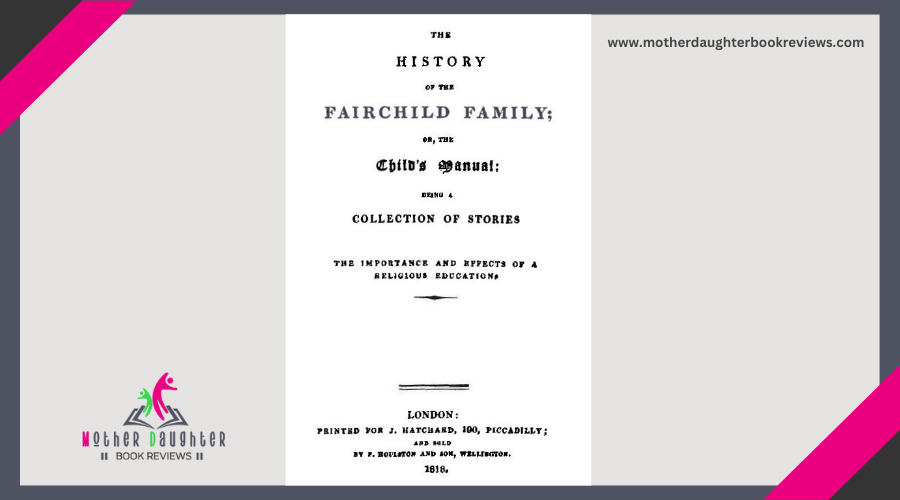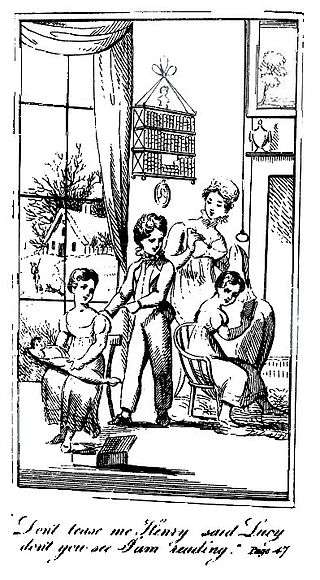Family Life and Virtue From the Classic the History of the Fairchild Family

In "The History of the Fairchild Family," you'll find a vivid portrayal of 19th-century domestic life, focusing on virtues and family dynamics. The Fairchilds, with Mr. Fairchild as the provider and Mrs. Fairchild handling household management, instill piety, obedience, and industriousness in their children. Religion anchors their daily routines, while parents guide moral development through example and discussion.
Sibling relationships emphasize respect and cooperation, with lessons in honesty, kindness, and humility woven throughout. Though they face challenges like conflicts and financial pressures, their commitment to virtue shines through. To uncover deeper insights into their compelling expedition, simply continue on.
Overview of the Fairchild Family
The Fairchild family, a quintessential example of 19th-century domestic life, embodies the virtues and challenges of their period. You'll find their daily lives steeped in simplicity and routine. The family, consisting of Mr. and Mrs. Fairchild and their three children, Lucy, Emily, and Henry, presents a model of piety, obedience, and industriousness. You see how each member plays a distinct role, contributing to the household's overall balance.
Mr. Fairchild, a devoted father, spends his days working to provide for the family, while Mrs. Fairchild manages the home with diligence and care. You notice how she imparts vital life skills and moral lessons to the children, ensuring they grow up with a strong sense of duty and virtue.
The children, in turn, respect and obey their parents, engaging in their studies and chores without complaint. Their interactions are marked by mutual respect and love, reflecting the family's adherence to societal norms of the time. Through their daily routines and interactions, you get a clear picture of a family striving to live virtuously, despite the inevitable challenges that come their way.
The Role of Religion
Central to the Fairchild family's life is their unwavering commitment to religion. You can see this dedication woven into every aspect of their daily routine. Morning and evening prayers are non-negotiable, offering the family moments of collective reflection and spiritual grounding. By actively participating in these rituals, you experience a sense of community and shared values that strengthen familial bonds.
The Fairchilds don't just practice religion; they live it. Biblical teachings serve as their moral compass, guiding decisions and interactions. When you read about their experiences, you notice how scriptural wisdom influences their behavior, from acts of kindness to resolving conflicts. The Fairchild parents, in particular, embody this devotion, modeling religious virtues like humility, patience, and charity for their children.
Attending church services is another cornerstone of their religious life. These gatherings aren't just about worship; they're opportunities for communal support and learning. By engaging with their faith community, the Fairchilds reinforce their beliefs and find strength in shared worship.
Parental Guidance
Regarding parental guidance, the Fairchilds don't leave anything to chance. They believe in a hands-on approach, ensuring their children grow up with strong moral values. You'll notice how Mr. and Mrs. Fairchild consistently engage with their children, discussing the importance of virtues like honesty, kindness, and respect. They don't just tell their kids what's right; they show them through daily interactions and stories that illustrate moral lessons.
You can see the Fairchilds often use real-life situations to teach their children. For example, when one of their children makes a mistake, they don't just scold them. Instead, they take the time to explain why the action was wrong and how it affects others, fostering an environment where learning from errors is encouraged. This method helps the children understand the consequences of their actions and builds their decision-making skills.

Sibling Relationships
Steering sibling relationships within the Fairchild family shows just how integral mutual respect and cooperation are to their daily lives. You'll notice how the children, Lucy, Emily, and Henry, actively support one another. They don't just coexist; they genuinely engage, fostering a bond that's both nurturing and instructive.
When conflicts arise, they're handled with a blend of patience and guidance. For instance, if Lucy and Emily disagree, they're encouraged to talk through their issues rather than let resentment fester. This approach teaches you that resolving disputes calmly can strengthen bonds rather than weaken them.
The Fairchild siblings also share responsibilities, which cultivates a sense of teamwork. Regardless of helping with household chores or assisting in each other's studies, their cooperative efforts highlight the importance of working together. You can see how this shared responsibility not only lightens individual burdens but also builds a foundation of trust and reliability.
Moreover, the siblings celebrate each other's successes and provide comfort during failures, reinforcing the idea that family should be your primary support system. By observing their interactions, you'll understand that positive sibling relationships require effort, empathy, and a willingness to grow together.
Moral Lessons
Building on the strong foundation of sibling relationships, the Fairchild family places a significant emphasis on moral lessons. You'll find that each family member is keenly aware of the importance of virtues such as honesty, kindness, and humility. Every day, the parents engage their children in meaningful conversations about right and wrong, often drawing from biblical teachings and personal anecdotes to illustrate their points.
When one of the children errs, the Fairchild parents don't just punish; they take the time to explain why the behavior was wrong and how it affects others. You're encouraged to reflect on your actions and contemplate how to make amends. This method guarantees that moral lessons are deeply understood, not just superficially acknowledged.
Moreover, the family makes a habit of discussing moral dilemmas during their shared time, encouraging each child to voice their thoughts. You'll notice that this practice fosters critical thinking and empathy, as each member learns to weigh different perspectives. The Fairchilds believe that by nurturing a strong moral foundation, they're preparing their children to face the complexities of life with integrity and compassion. Their approach is not just about rules but about cultivating a lifelong commitment to virtue.

Daily Routines
Starting the day with a sense of purpose, the Fairchild family maintains a well-structured daily routine that balances work, play, and reflection. You'll see them rise early, greeted by the soft light of dawn. The family gathers for morning prayers, setting a spiritual tone for the day. This practice instills a sense of unity and gratitude.
After prayers, you'd witness the children engaging in their studies. Education is highly valued, and lessons are both rigorous and engaging. Mrs. Fairchild oversees their learning, ensuring they grasp not only academics but also moral principles. This structured learning period is followed by chores, where each family member contributes to the household's upkeep.
Afternoons are reserved for more leisurely activities. You might find the children playing outside, exploring nature, or engaging in creative pursuits. These moments of play are vital for their development, allowing them to unwind and bond.
As evening approaches, the family reconvenes for dinner, sharing stories and reflecting on their day. This meal is a cornerstone of their routine, promoting communication and reinforcing their values. Ultimately, the day concludes with evening prayers, ensuring the Fairchilds end their day as they began—together and with purpose.
Challenges and Conflicts
Despite their well-structured routine, the Fairchild family isn't immune to challenges and conflicts. You might think that their disciplined lifestyle would shield them from turmoil, but it's far from the truth. Arguments flare up over household chores, and disagreements about parenting styles often create tension. When Mr. Fairchild insists on strict discipline while Mrs. Fairchild advocates for a more lenient approach, you can sense the strain in their relationship.
Children, too, face their share of conflicts. Sibling rivalry is a frequent visitor in the Fairchild household. Regardless of whether it's over toys, attention, or privileges, disputes between the children can escalate quickly. Young Henry's competitive nature clashes with his sister Emily's sensitive disposition, leading to frequent squabbles that require careful navigation.
External factors also contribute to their struggles. Financial pressures and societal expectations weigh heavily on the family. When Mr. Fairchild's business faces setbacks, stress seeps into their home life, affecting everyone. You notice how the family members cope differently, some withdrawing while others become more argumentative.
These challenges and conflicts reveal the complexities of family dynamics, showing that even the most disciplined families aren't exempt from life's inevitable difficulties.
Virtues in Practice
Living through their challenges, the Fairchild family embodies several key virtues that guide their interactions and decisions. These virtues not only help them navigate the complexities of family life but also serve as moral compasses in their daily activities.
First, patience is a virtue they practice consistently. When conflicts arise, they take a step back, breathe, and approach the situation with calmness. This allows them to think clearly and respond thoughtfully rather than react impulsively.
Second, kindness is deeply ingrained in their behavior. They make an effort to show compassion, regardless of whether it's through small acts of service or words of encouragement. This creates a nurturing environment where everyone feels valued and respected.
Finally, honesty is a cornerstone of their family dynamic. They believe in being truthful, even when it's difficult. Open communication helps them build trust and resolve misunderstandings swiftly.
Influence of Community
While virtues like patience, kindness, and honesty shape the internal dynamics of the Fairchild family, the influence of their community plays an equally significant role in their lives. You'll notice how neighbors, friends, and local institutions collectively impact the family's values and daily routines. Community events and gatherings offer the Fairchilds opportunities to practice and reinforce their virtues. For instance, attending church services provides a moral compass, guiding their actions and decisions.
You see, the community's shared values create a support system that the Fairchilds rely on. When challenges arise, such as illness or financial stress, the community's response demonstrates collective compassion and solidarity. This external support complements the family's internal virtues by providing tangible help and emotional encouragement.
Conclusion
The History of the Fairchild Family offers more than just a glimpse into family life in its era—it serves as a moral guide that underscores the importance of virtue, faith, and the strong bond of family. Through the everyday experiences of the Fairchild family, readers are gently reminded of timeless values such as honesty, humility, and the significance of a well-rooted spiritual life. The story not only highlights the beauty of familial love and unity but also teaches essential life lessons that continue to be relevant today.




